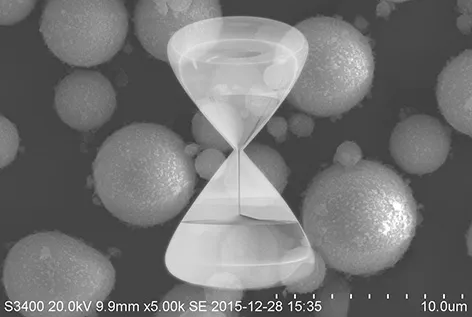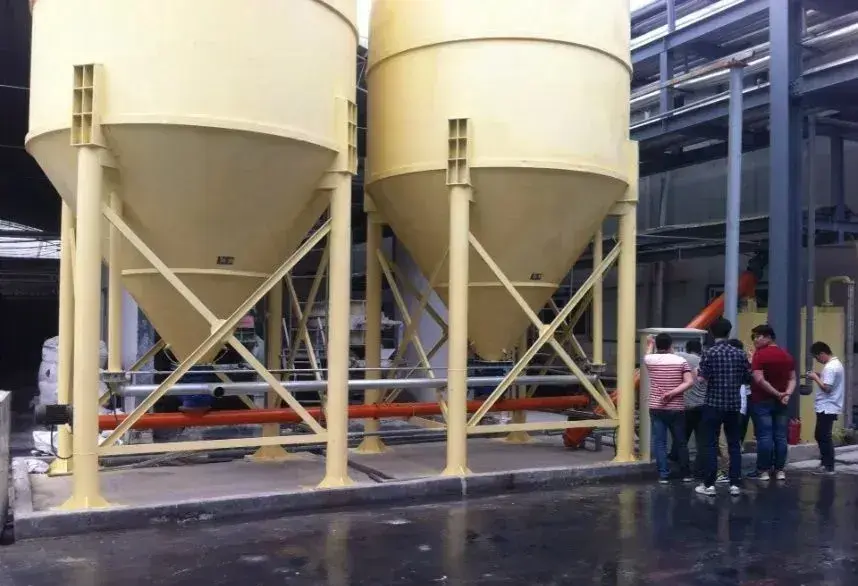수요 초미립 분말 (일반적으로 입자 크기가 10μm 미만 또는 1μm 미만인) 나노입자는 제약, 첨단 세라믹, 전자, 특수 화학 등 다양한 첨단 산업 분야에서 기하급수적으로 성장해 왔습니다. 초미분쇄 그리고 정확한 분류 제품 품질과 기능성을 보장하는 데 매우 중요합니다. 본 논문에서는 최신 초미분 분쇄기와 분급기가 이러한 엄격한 요건을 충족하기 위해 어떻게 함께 작동하는지 그 메커니즘을 살펴봅니다.
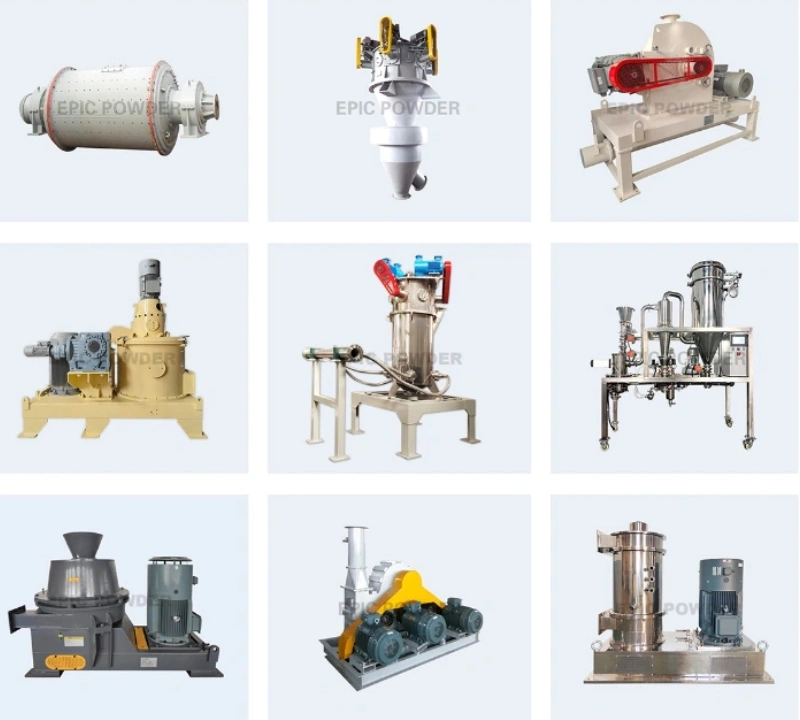
"초미세"에 대한 산업 표준은 무엇입니까?
- 초미립분말: d97 ≤ 10 μm (1500 메시 이상에 해당)
- 서브마이크론: d97 ≤ 2 μm (6000 메시 이상)
- 나노미터: d50 < 100 nm(건식 가공으로는 거의 달성 불가능, 일반적으로 습식 밀링이나 특수 공정 필요)
현재 건식 초미분쇄기의 주요 목표 범위는 1~20μm이며, 입자 크기 분포는 매우 좁습니다(스팬 = (d90~d10)/d50은 일반적으로 1.2~1.6 사이에서 제어됨).
초미립자 분쇄기의 주요 유형 및 작동 원리
| 장비 유형 | 연삭 원리 | 전형적인 d97 | 분류 시스템 | 일반적인 재료 |
|---|---|---|---|---|
| 유동층 제트 밀 | 고속 대향 공기 분사; 입자-입자 충돌 | 1~20㎛ | 고속 터빈 분류기 내장 | 활석, 카올린, 마이카, 카본블랙, 실리카 |
| 디스크형 제트밀 | 평평한 반대 제트기 | 2~30㎛ | 외부 강제 와류 분류기 | GCC, 규회석, 황산바륨 |
| 기계적인 임팩트 밀 + 분류기 (ACM, ICM, MS) | 로터 + 라이너 충격 + 전단 | 3~30㎛ | 내부 또는 외부 터빈 분류기 | GCC, 흑연, 열분해 카본블랙 |
| 고속 충격 밀 | 핀/망치 | 5~100㎛ | 내장된 분류 휠 | 중간-경질 재료 |
| 사이클론 제트 밀(QLM/MQL) | 멀티노즐 + 순환 파이프라인 | 1~15㎛ | 내부 동적 분류기 | GCC, 플라이애시, 세라믹 파우더 |
| 스팀 제트 밀(s-Jet) | 300~400°C 과열 증기 | 0.2~5㎛ | 에어젯 밀과 동일하지만 에너지가 더 높습니다. | TiO₂, Al₂O₃, 배터리 소재 |
초미세 분쇄는 실제로 어떻게 달성되는가?
1. 금속 충돌 대신 입자 간 충돌
제트밀에서는 입자가 300~1200m/s로 가속됩니다.
충돌 에너지는 기계적 분쇄기의 10~100배로, 입자가 무작위로 부서지는 대신 결정 분열면을 따라 부서질 수 있습니다.
- 동시에 작동하는 여러 에너지 메커니즘
- 제트 밀: 충돌 + 전단 + 팽창 냉각
- 기계적 초미세 분쇄기: 충격 + 전단 + 마모
- 스팀 제트 밀: 더 높은 운동 에너지 + 열 연화
- 자가분쇄 효과
거친 입자는 원심장에서 더 오래 머무르고, 미세한 입자는 즉시 제거됩니다 → 선택적 분쇄.
정확한 분류는 어떻게 달성되는가?
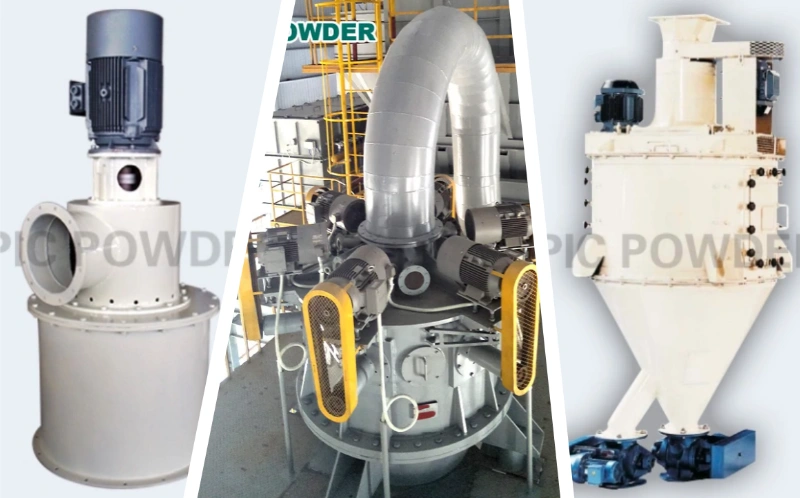
최신 초미세 분쇄 시스템은 강제 소용돌이 동적 분류기(터빈 분류기)에 전적으로 의존합니다.
원리는 간단하지만 매우 효과적입니다.
단순화된 절단 크기 공식:
d50 ≒ √[(18μ·Q)/(π·ρp·n²·r²·Z)]
어디:
- ρp: 입자 밀도
- N: 로터 속도
- 지: 블레이드 수
- 큐: 공기 흐름
날카로운 절단으로 d97 ≤ 10 μm를 가능하게 하는 주요 설계 기능
| 디자인 특징 | 기능 |
|---|---|
| 높은 회전 속도 | 2000~18,000 rpm → 강한 원심력 |
| 대형 분류기 휠 직경 | 분리 반경을 증가시키고 선명도를 향상시킵니다. |
| 여러 개의 2차 공기 유입구 | 거친 분말 오염을 줄입니다. |
| 조정 가능한 로터 간격 | 출력과 절단 지점 간의 균형을 미세 조정합니다. |
| 내마모성 세라믹 로터 | 고속에서도 정밀도 유지 |
| VFD 제어 | ±0.5μm 정확도의 실시간 d50 조정 |
실제 사례 데이터(2024~2025년)
| 재료 | 장비 모델 | d50을 공급하세요 | 제품 d97 | 기간 | 용량 |
|---|---|---|---|---|---|
| GCC | 호소카와 알파인 AFG-400 | 25㎛ | 3.5㎛ | 1.35 | 800kg/시 |
| 활석 | 네취 CGS-150 | 18㎛ | 2.0㎛ | 1.18 | 600kg/시 |
| 열분해 카본블랙 | Mianyang Liuneng LFJ-420 | 12㎛ | 4.2㎛ | 1.45 | 300kg/시 |
| 운모(습식 분쇄 후 건식 정제) | 칭다오 비나 TBM-800 + ATP-400 | 35㎛ | 6.5㎛ | 1.25 | 1.2톤/시간 |
"제트밀+분류기"가 절대적인 산업 표준이 된 이유는 무엇일까?
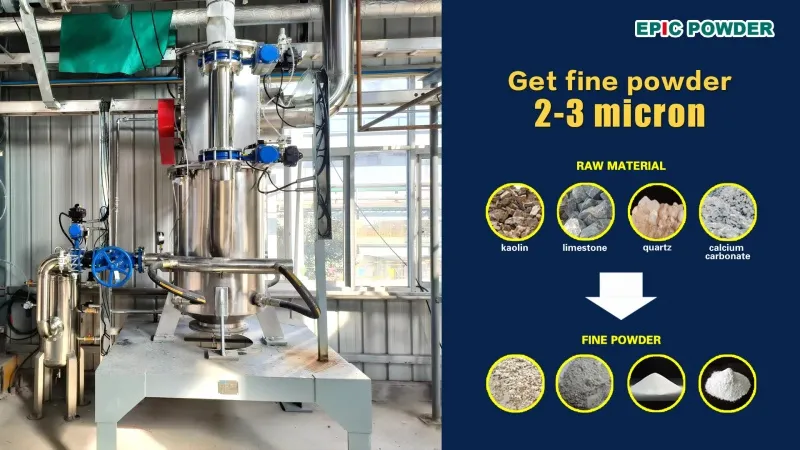
- 금속 오염 없음 (배터리 소재 및 고급 필러에 필수)
- 입자 모양(판 모양, 각진 모양)을 유지합니다. → 구형 볼밀 분말보다 강화성이 우수함
- 매우 좁은 PSD: 플라스틱/고무의 더 높은 패킹 밀도와 더 강력한 기계적 성능
- 확장 가능: 50g/h 실험실 규모에서 5t/h 산업 규모까지
- 긴 서비스 수명: 8760시간/년 연속 작동을 위해 설계된 마모 부품
결론
현대의 초미립자 분쇄기는 더 이상 "무차별적인 힘으로 분쇄"하는 방식에 의존하지 않습니다.
입자 충돌 에너지를 정밀하게 제어하고 고속 와류 분류로 미세 입자를 순간적으로 추출하여 분쇄 → 분류 → 조분말 반환의 폐쇄 루프를 형성하여 초미립자 결과를 달성합니다.
이것이 d97 2–5 μm 및 span < 1.4가 비금속 광물 및 회수 카본 블랙 산업에서 일상적인 성능 벤치마크가 된 이유입니다.
에픽 파우더는 초미립자 분말 산업 분야에서 20년 이상의 경력을 보유하고 있습니다. 초미립자 분말의 파쇄, 분쇄, 분급 및 개질 공정에 중점을 두고 초미립자 분말의 미래 개발을 적극적으로 추진하고 있습니다. 무료 상담 및 맞춤형 솔루션을 원하시면 지금 바로 문의하세요! 저희 전문가 팀은 고품질 제품과 서비스를 제공하여 고객의 분말 가공 가치를 극대화하는 데 전념합니다. 에픽 파우더 - 믿을 수 있는 분말 가공 전문가!
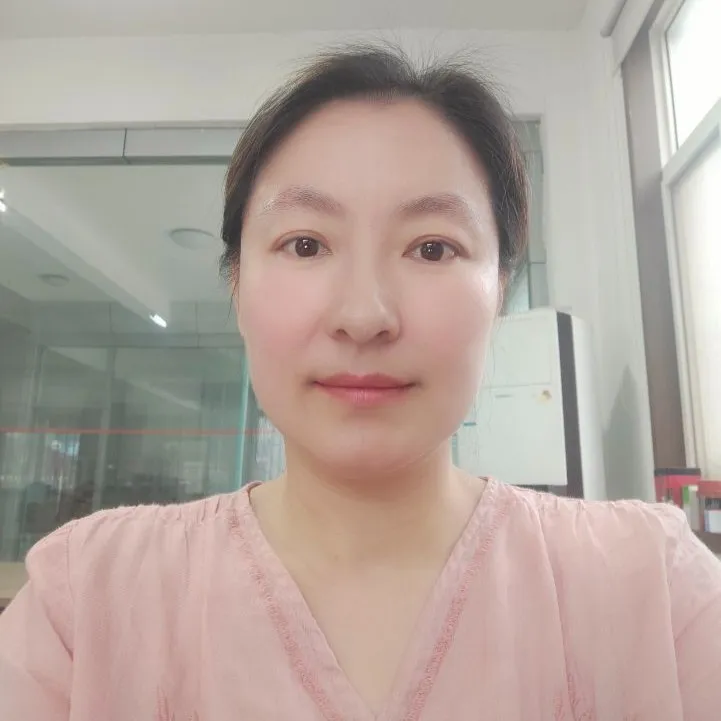
읽어주셔서 감사합니다. 제 글이 도움이 되셨으면 좋겠습니다. 아래에 댓글을 남겨주세요. 추가 문의 사항은 젤다 온라인 고객 담당자에게 연락하실 수도 있습니다.
— 게시자 에밀리 첸
